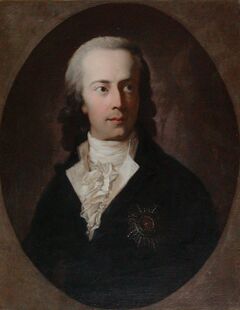Tobias Labrax Holm
Tobias Labrax Holm | |
|---|---|
 | |
| State Chancellor of Scovern | |
| In office June 5, 1835 – September 18, 1836 | |
| Monarch | Johann Augustus |
| Preceded by | Mathias Lindberg Ginau |
| Succeeded by | Anders Bæk-Bonde |
| Member of the Rigsdagen | |
| In office March 18, 1797 – September 18, 1836 | |
| Personal details | |
| Born | July 10, 1760 Hennenhus, Alfarnes, Vestelia, Scovern |
| Died | November 28, 1844 (aged 84) Kjuflingsborg, Kjufling, Mesconia, Scovern |
| Nationality | Vestelian |
| Political party | Pileads |
Tobias Labrax Holm (July 10, 1760 – November 28, 1844; aged 84) was a Scovernois politician and statesman who pioneered the development of constitutional monarchism, parliamentary sovereignty and the expansion of suffrage in Scovern in the early 19th-century. He also served a year-long tenure as State Chancellor between 1835–36 amidst growing tensions in Bonnlitz-Ostbrücken, which was governed by Scovern under a personal union, during Weranian Unification. Holm's sudden dismissal during this period due to conflicting policy with Johann Augustus facilitated the creation and ratification of Scovern's first codified constitution in 1840, which he assisted in writing.
Holm was born in 1760 to a noble family from southern Vestelia. Homeschooled until 17, Holm attended university in Kalstad, reading in history and politics. Growing up amongst the Etrurian and Weranian Revolutions became influential in the development of Holm's personal ideology. He entered the Rigsdagen in 1797 during the tenure of Karl Hans von Gassen, who led a particularly conservative and monarchist government. An outspoken advocate of liberalism and reform, Holm was influential in the development of the Rigsdagen's liberal wing in the 1800s and eventually became the leader of the Pileads. Holm's Pileads advocated for parliamentary reform amidst the Euclean Spring, but conflicted wholly with the absolutist views of Carl Frederick II, and were often mocked. When Johann Augustus ascended to the throne in 1822, talks of parliamentary reform heightened and Holm became emblematic of a new age of parliamentarians in Scovernois politics.
The Pileads eventually became the largest and most influential political grouping in the Rigsdagen. When Holm's predecessor Mathias Lindberg Ginau resigned in 1835, Holm was appointed as his successor. Holm immediately conflicted with the King over events in Werania, and was unconcerned with foreign affairs, to the dismay of Johann Augustus, who took an immediate dislike to him. He instead spent his time designing and refining reforms for the expansion of parliamentary sovereignty domestically. The extended terms of von Gassen and Ginau had given a particular importance to the head-of-government within the Rigsdagen, which came to a head when Johann Augustus relinquished Holm of his position after only a year in office due to his stance on war in Bonnlitz-Ostbrücken.
Now dismissed from office and his position in the Rigsdagen, Holm spent most of his time supporting the Pileads in their conflict with the monarch over parliamentary sovereignty. Following a disastrous turnout of the war in Bonnlitz-Ostbrücken, Holm's ideological successor Thorbjørn Georg Carlsen began drafting a codified national constitution, enshrining the sovereignty of the Rigsdagen in law. Holm assisted in writing much of the constitution, and with its ratification in 1840, Scovern became one of Euclea's few constitutional monarchies and the first to codify complete parliamentary sovereignty and representative democracy.
Holm died shortly after in 1844 at a country house in the Flosedalen, but left behind a legacy of reformation and representation – to this day he is viewed invariably as the father of democracy in Scovern. He may also have influenced similar legislative reforms such as the Silent Revolution in Caldia. In 1922 a large statue of Holm was unveiled in the centre of Rigsdagenplads in Rimso, commemorating his developments to democracy and parliamentarianism in Scovern.
See also
- Pileads, the party that Holm created and led